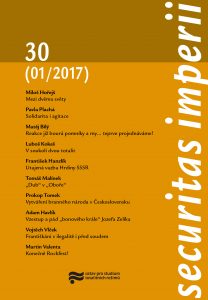Vzestup a pád „bonového krále“ Jozefa Zelíka. Případová studie k dějinám hospodářské kriminality před rokem 1989
The rise and fall of Jozef Zelík, the “King of Bons”. Case study on the history of economic crime before 1989
Author(s): Adam HavlíkSubject(s): Economy, Criminology, Post-War period (1950 - 1989)
Published by: Ústav pro studium totalitních režimů
Keywords: Jozef Zelík; economic crime; Czechoslovakia; black market; currency crime
Summary/Abstract: The paper details the life story of Jozef Zelík, nicknamed the “King of Bons”, from Bratislava, who was involved in all kinds of economic crime activities in the normalization period, including foreign currency machinations, speculative sale of Tuzex vouchers and smuggling of precious metals and antiquities. Gradually, he acquired an unusually strong position in this field and was practically a head of a whole net of traffickers and receivers. However, his activities attracted attention from the police and he finally emigrated to Austria in 1982. His case also shows different strategies employed by underhand moneychangers when interacting with Czechoslovakia’s state organs (e.g., unofficial practices aimed at securing the “peace to work”). Zelík’s economic power was also reflected in his pompous lifestyle. Before 1989, opulent consumption and conscious demonstration of one’s wealth was a typical attribute of a social class that benefited from currency crime and other sneaky business. The article is in the form of a case study which makes a connection between one particular story from the Czechoslovak black market and the period (mainly economic and legal) context.
Journal: Securitas imperii
- Issue Year: 2017
- Issue No: 30
- Page Range: 224-243
- Page Count: 20
- Language: Polish

